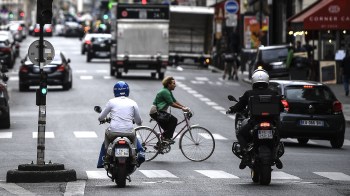Divided Belgium is of 2 minds on split
TEXT OF STORY
KAI RYSSDAL: Apart from the occasional mention of the European Union, we don’t really have much reason to talk about Belgium on this program. Much of the E.U.’s bureaucracy is based in Brussels, but the country itself is in the middle of its biggest political crisis ever. It’s been nearly six months since national elections. Still, there’s no government. Just this weekend leaders of the separate Dutch and French speaking populations called off negotiations. The French-speaking Walloons want to keep the country together, but more than half the Dutch-speaking Flemish want independence — largely for economic reasons.
John Laurenson reports from the Flemish city of Leuven on the divide that could split Belgium in two.
JOHN LAURENSON: You see the difference as soon as you cross Belgium’s invisible dividing line from Wallonia into Flanders. Flanders looks wealthier: lots of carefree people riding bikes, shopping and lunching in cafes. Leuven built its fortune on beer. The Stella Artois factory is here, but so are high-tech firms like LMS, that produces software for Boeing, Airbus and Ferrari. Flanders is an economic success story. Wallonia to the south is not. The mayor of Leuven is Louis Tobback.
LOUIS TOBBACK: The situation in Flanders is that of a very rich part of Europe with only luxury problems, with close to full employment. While in Wallonia you still have unemployment of 25 percent. So in the face of two different evolutions you have to adopt two different policies, and that is not possible within the actual framework of the state.
Many Flemings also say they are tired of subsidizing economic failure.
In a cafe, political commentator Mia Doornaert tells me Wallonia should be taken off the drip.
MIA DOORNAERT: The money which has been transferred to Wallonia, it went to creating or keeping jobs in the public sector or in old sectors of industry, but it hasn’t been used to turn the region around, to invest in new industries, in new technologies, and so the feeling is that the money disappears in a bottomless pit.
The annual fair at Liege, Wallonia’s largest town. They used to call this place the “burning city.” The sparks from the steel mills lit up the sky at night, but the heavy industry that was the economic engine of Flanders and Wallonia is long gone. People here are noticeably poorer, but a new generation of Walloon politicians believes that, if Belgium is to survive long-term, Wallonia has to revitalize its economy. This is Senator Alain Destexhe.
ALAIN DESTEXHE: I still hope that a compromise could be found. What we should do from our side is modernize our economy, which leads to Wallonia in the south of the land to catch up with Flanders.
Destexhe believes Belgium is worth keeping in tact. It’s a name known abroad. It’s not a bad calling card, and separation could destroy Brussels: capital of Belgium, Flanders and the European Union.
BRUSSELS STUDENTS: We’re from Belgium. We’re from Belgium. Pretty, pretty Belgium. Pretty pretty Belgium.
Students, their faces painted with the black, gold and red of the Belgian flag, singing their support for Belgium in the center of Brussels. Walk around this city these days and you’ll see flags hung out the windows of people’s houses by ordinary citizens like this man.
BRUSSELS CITIZEN: At a time we are talking about Europe. Made of so many countries, it’s useless and completely stupid and irrelevant to divide a small country with 10 million inhabitants like Belgium. We are back to the tribes from the ancient times.
LAURENSON: And what would happen to Brussels, do you think, if they split?
CITIZEN: It will die out.
Next week marks half a year since Belgium was last ruled as a single country. Some are now wondering if it ever will be again.
In Brussels, I’m John Laurenson for Marketplace.
There’s a lot happening in the world. Through it all, Marketplace is here for you.
You rely on Marketplace to break down the world’s events and tell you how it affects you in a fact-based, approachable way. We rely on your financial support to keep making that possible.
Your donation today powers the independent journalism that you rely on. For just $5/month, you can help sustain Marketplace so we can keep reporting on the things that matter to you.


















